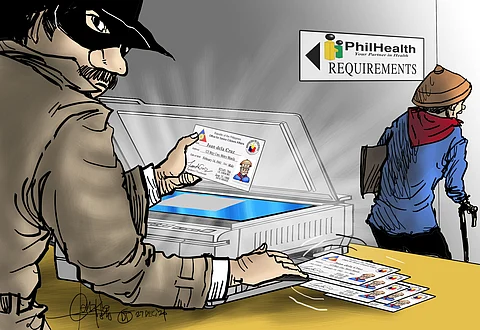
- NEWS
- the EDIT
- COMMENTARY
- BUSINESS
- LIFE
- SHOW
- ACTION
- GLOBAL GOALS
- SNAPS
- DYARYO TIRADA
- MORE

Among the more deplorable disclosures of the Commission on Audit (CoA) on the situation at the state-owned Philippine Health Insurance Corp. (PhilHealth) was how it was taking advantage of vulnerable Filipinos aged 60 and older.
PhilHealth records showed it had 8.6-million senior citizen members, whom the government subsidized at the equivalent of P5,000 in monthly contributions that amounted to P43 billion of its budget.
Like the fragmented record keeping at the agency, the CoA found process controls in the collection of membership data and the management of senior citizen accounts were deficient, resulting in incomplete and erroneous data entry for 1,335,274, or 15.55 percent, of the enrolled beneficiaries, increasing the risk of duplicate and multiple enrollments in the PhilHealth Members Information System; the duplication and numerous entries for 266,665 senior members, equivalent to a P1.333-billion subsidy; and the 4,062 active accounts of deceased members in the PhilHealth Members Database and billings to the Department of Budget and Management in 2023.
The corporation thus risks generating inaccurate or unreliable data and the possible payment of fraudulent claims.
The National Health Insurance Act of 2013 granted PhilHealth the powers and functions to establish and maintain an electronic database of all its members and ensure its security to facilitate efficient and effective services, and to invest in the acceleration of the corporation’s information technology system.
With the enactment of the Universal Health Care (UHC) Act, every Filipino citizen should be under PhilHealth’s National Health Insurance Program. One of the UHC’s objectives is to ensure that all Filipinos are guaranteed equitable access to quality and affordable healthcare goods and services and are protected against financial risk.
As a member of the program, a Filipino citizen without the capacity to pay a premium will get a government subsidy, which includes enrollment of all SCs, not covered by any other member category.
Incomplete and erroneous data entry have led to duplicate and multiple enrollments of senior citizen beneficiaries.
Assuming that of the 266,665 enrolled senior citizen members with multiple entries, 133,332 (or half) represent unique or original data, the estimated minimum overbilling by PhilHealth to the national government, at ₱P5,000 per member, would amount to ₱P666.66 million.
The CoA said the amount could have been significantly higher due to the presence of multiple entries where instead of P5,000 for one senior member, P20,000 or four times was billed to the government.
According to CoA, it belabors the obvious that the duplicate or multiple entries not only overstate the billing of premiums to the national government through the DBM but may also mislead management and the public as to the actual number of beneficiaries already covered in the NHIP, as well as the measurement of PhilHealth’s actual performance and accomplishments.
PhilHealth, thus, was ordered to clean up its database by removing duplicate and multiple entries to prevent the overbilling of subsidies.
The agency said the criteria for the extraction of the senior citizens’ list will be updated.
Also, another anomaly was the 4,062 deceased members who were still included in the subsidy billings to the Department of Budget and Management (DBM) for 2023.
State auditors then wrote 250 healthcare institutions requesting their list of deceased patients as of 31 December 2022, to which 63 HCIs responded.
Verification of the data gathered revealed that 3,616 senior members tagged by the HCIs as deceased esteem 2019 and 2022 were still included in the PMD.
The slew of questionable gaps in the records of PhilHealth opened the opportunity for the unprecedented removal of the P74-billion subsidy for the destitute next year.
How can the public expect PhilHealth to provide adequate health care when it struggles to maintain accurate records?
